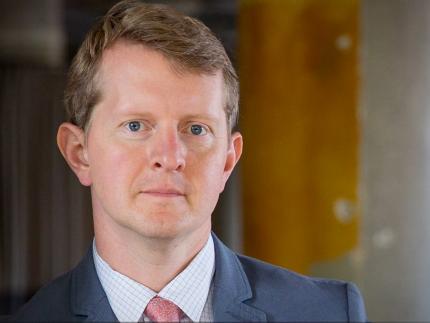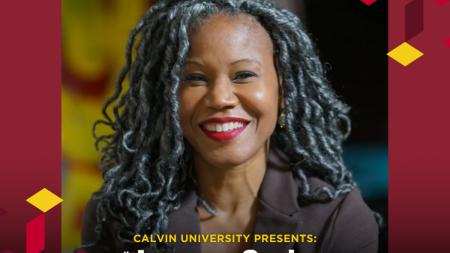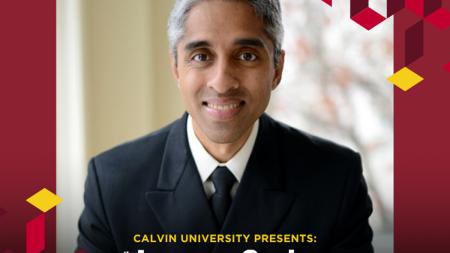Who Is Ken Jennings? Thoughts from a Jeopardy! Champion

Nearly 20 years ago Ken Jennings set a record that still stands as the longest winning streak on the quiz show Jeopardy! – 74 games – winning $2.52 million in the process. In his January Series presentation at Calvin University, Jennings shared stories and reflections from his time on the show and why it’s helpful to take an interest in everything.
Speaking on Jan. 23 to a live audience that included two other former Jeopardy! contestants, Jennings laid out what he called a defense of trivia. The word triviaitself, he suggested, gives it an image problem, sounding like trivial, a synonym for unimportant. But trivia, said Jennings, has to do with knowing stuff – and specifically knowing weird stuff – about everything.
Reflecting on this, Jennings answered a question that many people have about the quiz show. “[Something] people don’t really appreciate on Jeopardy! is that it’s very hard to study for. These contestants that you see on the show have to be masters of every topic, because until the host reveals those categories, they don’t know what they’re going to be. . . . It could be anything. Until those categories appear, it could be Shakespeare, it could be hiphop, it could be molecular biology. You have to be ready to know just about everything.”
Jennings pointed to five advantages he sees in being a generalist.
First, trivia can open people to a sense of wonder. He noted that there are many things we need to know for our work or to maintain good relationships. Trivia, on the other hand, is knowledge for its own sake, free of responsibility.
“If I tell you that there’s a crater on Venus named for Laura Ingalls Wilder, you now have no responsibility whatsoever. What practical thing could you possibly do with that bit of knowledge? . . . But there’s something beautiful about just being able to know that for its own sake,” he said.
Jennings told a story of a friend who had read the whole Encyclopedia Britannica. Jennings asked him his favorite fact and was told that it was that opossums have 13 nipples. Why that, out of all of the information contained in the set? “It was just so random and unexpected. It reminds you that the universe is a strange and beautiful place to know some of these things,” the friend told him.
Another advantage of trivia, said Jennings, is that it broadens the mind. He suggested that most people specialize not only at work but also in their personal lives. People like some kinds of music or sports and not others, and they know more about the ones they like. Generalists, on the other hand, tend to be “omnivorously curious,” interested in everything, fascinated by everything. This means, said Jennings, that they are interested and engaged in the world around them and open to learning new things. An interesting fact becomes a gateway to learning something new.
For example, said Jennings, if you learn that at the premiere of Stravinsky’s ballet Rite of Spring the choreography was so avant garde that the audience actually rioted, the topic suddenly becomes interesting. The writers for Jeopardy!work hard, he said, to extract bits of information that might get people interested even in categories they wouldn’t expect to be drawn to.
A third advantage of trivia, said Jennings, is that it makes learning new things easier. He described an analogy he heard in university about the brain as a butterfly net. Facts and knowledge are everywhere, especially in our age of information, he said.
“And you’re kind of going through life swatting at the stuff you want to know as if with a butterfly net, hoping to catch some of it and keep it in your head. And the less you know . . . the wider the mesh of the net is. So you’re swinging a net . . . and butterflies are just flying in and out, because you hear something, and you have no context, nothing to file it with, nothing to relate it to. Everything is new at first.”
He explained as an example that he had read the previous evening that Equatorial Guinea is moving its capital from Malabo to Ciudad de la Paz. Now, many people don’t know what or where Equatorial Guinea is or why countries might move their capitals, so they might not catch this at all.
“But it’s different if your frame of reference is different,” said Jennings: if you know even vaguely where the country is, that it’s a coastal African country, or that some countries are moving their capitals inland to more climate-safe spaces, you have a good chance of remembering that fact, as it now relates to what you already know.
“Your mesh just got a little bit tighter, and it’s going to be easier to learn the next thing about . . . Equatorial Guinea or [something else], and the more you know, the mesh gets tighter and tighter and tighter,” explained Jennings.
A fourth point about trivia, Jennings noted, is that a lot of it is actually not trivial at all. Some details, he acknowledged, such as some sports statistics or the middle names of celebrities, are not really very important, but in the world of trivia, including on Jeopardy! there are facts about “historical trends, scientific breakthroughs, clean energy, cancer treatment, the Civil Rights movement – stuff we actually should know about, stuff that’s not trivial by any definition.”
In life we make a lot of decisions about what we’ll study, where we’ll work, whom we’ll marry, where we’ll live, whom we’ll vote for, and so on, said Jennings. We need facts and good information to make those choices. For example, if our votes are affecting our country’s decisions on intercultural relationships, we should know a bit about the countries and cultures with whom we’re interacting.
Another advantage of trivia, suggested Jennings, is that the things we know make it easier to get to know people. Knowing a little bit about a lot of things can open doors to conversation and can help to create connections between people.
“What we now call trivia used to be considered cultural literacy. You just assumed that everybody in the culture read the same books and watched the same three TV channels, and we all saw the same newscast last night, and there was kind of a common thing that bound the culture together.” That reality had drawbacks, such as a limited scope and worldview, but it created a sense of shared experience.
A change in that reality, where people are specializing in small pools of knowledge, has contributed to the polarization of our culture, said Jennings. “We just don’t know each other because we’re not familiar with each other’s factual universes at all. It turns out that cultural literacy was important because it brought people together.”
Jennings sees hope in communications and knowledge-sharing spaces like Google Earth, where people from cultures and countries across the world from each other can explore other cultures and better understand one another. He suggests that if we could use facts to break down stereotypes and propaganda, we could reach peace much more quickly.
This connection also works on an individual basis, said Jennings. “Have you ever had the experience of telling someone where you’re from, or where you went to school, or what you studied, and they say, ‘Oh, yeah! You know who I know from there . . . ?’ There’s an instant connection that gets made when people share a piece of knowledge in common.”
Jennings also shared some fun facts about the Jeopardy! show. The pace is quick, he explained, as each episode goes through 61 clues in 22 minutes, and on each filming day they record five episodes. Each new contestant is learning the show live as they are experiencing it. And the signaling devices (the buzzers) can be tricky. Contestants have to wait until the host finishes reading the question and the signaling devices are activated. If they click it too early, they can be locked out for several seconds.
In addition, contestants are not generally allowed to tell others that they are on the show. For most contestants, while the episodes they appear in are being recorded, their coworkers and most of their family and friends don’t know about their time on the show until those episodes air months later. Jennings described the strange situation in which his boss at his computer programming job had to cover his absences for months, while he would fly to Los Angeles for a couple of days, then fly home and go to a morning staff meeting. It was a sort of glamorous double life, he said, but difficult to maintain.
He also had the rare experience of still being a contestant when his earliest episodes began to air. The worst part at that point, he said, was meeting new contestants on the show who would be crestfallen when they met him, knowing he’d been on for months.
There were a few categories during his months on the show that Jennings knew he was weak on, and which seemed to him to come up pretty often, he said. “[They] turned out to be my trivia Kryptonite: hockey and country music. Anything with a mullet, and I was done,” he joked. But the clue that ended his winning streak, he said, was in the business and industry sector, about H&R Block.
Later taking on the role of host, Jennings said, he found it much more difficult than he expected: “Here’s the problem: Alex [Trebek] did it for 38 years, and he was so good that he made it look so easy. He was the best!” To do the job well and keep things moving smoothly, showcasing the contestants and the gameboard, staying unnoticed while constantly in the spotlight, framing the game for the audience, and acting as a referee when needed, is demanding, said Jennings. Yet he does love the work despite the difficulty. “It’s a great gig. I pinch myself every time I’m out there,” he shared.
As a child, Jennings said he often wondered where all the Jeopardy! contestants came from who knew so much and were able to earn money with their knowledge. The secret, he said, is not a photographic memory and a childhood spent reading through the encyclopedia. Rather, they are people who are interested in everything.
“When you’re interested in something, the facts just stick,” suggested Jennings. “If you can find a way to convince yourself that everything matters, that you’re interested in everything, that you pay attention to everything, then everything sticks. . . . You don’t have to have a superpower; you just have to be committed to learning all the time. And it’s easier than it sounds.”
To develop an attitude of always learning through life, Jennings suggested trying to learn something each hour of the day, whether from radio, podcasts, books, conversations, or other means. For example, if you’re reading the nutritional information on the back of your cereal box, look up one of the elements that’s not familiar.
Jennings concluded, “On Jeopardy! we often say that you have to answer in the form of a question. . . . But in addition to answering in the form of a question, it’s possible to live your whole life in the form of a question – always wondering, always curious about everything. This is a way you can decide to be. And I think it’s a wonderful way to live.”


